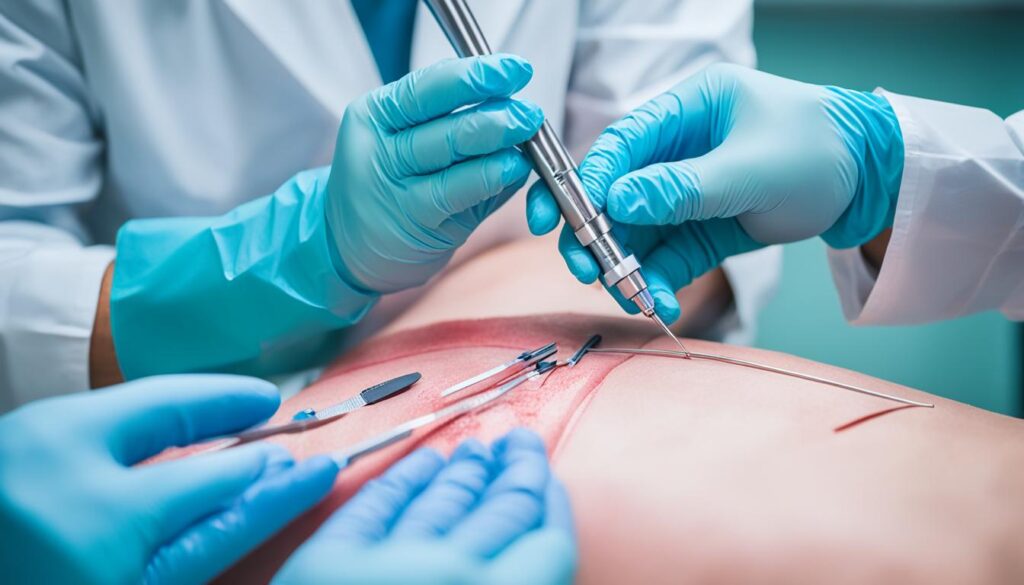Welcome to our comprehensive guide on effective anal fissure treatment options. If you’re experiencing the discomfort of anal fissures, you’ll be relieved to know that there are various treatment options available to help relieve pain and promote natural healing.
Table of Contents
ToggleAnal fissures can cause intense pain and discomfort during bowel movements, making it essential to find the right treatment approach that suits your condition. Whether you’re looking for non-surgical measures or considering surgical options, we’ve got you covered with all the information you need.
Let’s explore the different treatment options available to relieve pain and aid in the natural healing process. From home remedies to nonsurgical and surgical treatments, we’ll provide you with in-depth insights and advice to help you make informed decisions about your health.
But first, let’s understand how anal fissures are diagnosed and what you can expect during your examination. Remember, effective treatment starts with accurate diagnosis.
Diagnosis of Anal Fissures
Anal fissures can typically be diagnosed through a physical examination, which involves a gentle inspection of the anal region. The healthcare provider will carefully examine the area to look for signs of a fissure, such as a fresh tear or a chronic fissure with deeper tear and fleshy growths.
The location of the fissure can provide important clues about its cause. For example, fissures located at the midline are commonly caused by constipation or trauma during bowel movements. Fissures in other locations may be associated with other conditions or underlying health issues.
In some cases, further testing may be recommended to determine if there are any underlying conditions contributing to the anal fissure. Two common tests include:
- Anoscopy: This procedure involves the insertion of a small, lighted tube called an anoscope into the rectum to get a closer view of the anal canal. It allows the healthcare provider to identify any abnormalities or other potential causes of the anal fissure.
- Colonoscopy: A colonoscopy may be recommended if the healthcare provider suspects that the anal fissure is related to a more significant condition affecting the colon or rectum. During this procedure, a flexible tube with a camera is inserted through the rectum to examine the entire colon and rectum.
By conducting a thorough physical exam and, if necessary, performing further testing, healthcare providers can accurately diagnose anal fissures and identify any underlying causes. This information plays a crucial role in developing an effective treatment plan that addresses the individual’s specific needs.

Home Treatment for Anal Fissures
If you’re experiencing the discomfort of anal fissures, you’ll be pleased to know that many cases can heal within a few weeks with appropriate home treatment. By following these simple measures, you can promote healing and find relief.
- Increase your fiber intake: Consuming fiber-rich foods like fruits, vegetables, whole grains, and legumes can help soften your stools and make them easier to pass. Aim for at least 25-30 grams of fiber per day.
- Drink adequate fluids: Staying hydrated is crucial for maintaining soft stools. Aim to drink at least 8-10 glasses of water per day or include other hydrating fluids like herbal tea or fruit-infused water.
- Avoid straining during bowel movements: Straining can further aggravate the anal fissures. Be patient and allow your body to have a natural bowel movement without excessive force.
- Take warm water soaks: Soaking your bottom in warm water for 10-15 minutes a few times a day can help relax the sphincter muscles and reduce pain. This can be done by sitting in a bathtub or using a sitz bath, a special basin designed for this purpose.
These home remedies can help keep your stools soft, relieve pain, and promote the healing of anal fissures. However, it’s important to note that if your symptoms persist or worsen despite home treatment, it’s advisable to seek further medical intervention.
To get a better idea about the effectiveness of these home treatments, take a look at the table below:
| Treatment | Effectiveness |
|---|---|
| Increasing fiber intake | Helps soften stools and promotes healing |
| Drinking adequate fluids | Prevents dehydration and maintains soft stools |
| Avoiding straining during bowel movements | Reduces pressure on the anal area and promotes healing |
| Taking warm water soaks | Relaxes sphincter muscles and provides pain relief |
Nonsurgical Treatment Options
When it comes to treating anal fissures, surgery is not always the first option. There are nonsurgical treatments available that can effectively relieve symptoms and promote healing. These treatments can be used when conservative measures fail to provide relief or are not effective enough.
1. Nitroglycerin
Nitroglycerin is a commonly used treatment for anal fissures. It is available in the form of an externally applied cream or ointment. Nitroglycerin works by relaxing the anal sphincter muscle, improving blood flow to the area, and promoting healing. It is typically applied to the affected area two to three times a day for several weeks.
2. Lidocaine
Lidocaine is a topical anesthetic that can provide temporary pain relief for anal fissures. It works by numbing the area, reducing discomfort, and allowing for easier bowel movements. Lidocaine creams or ointments can be applied directly to the affected area as needed to alleviate pain and discomfort.
3. Botox
Botox injections have shown promising results in the treatment of anal fissures. Botox, or onabotulinumtoxinA, is injected into the anal sphincter muscle to induce temporary paralysis. This relaxation of the muscle can help reduce pain and allow the fissure to heal. Botox injections are typically performed in an outpatient setting and may require repeat injections if symptoms persist.
4. Blood Pressure Medications
Some blood pressure medications, such as nifedipine or diltiazem, can also be used to treat anal fissures. These medications work by relaxing the anal sphincter muscle, reducing pressure and allowing the fissure to heal. They are typically applied as topical creams or ointments and may need to be used for several weeks or months for optimal results.
It’s important to note that while these nonsurgical treatments can be effective in many cases, their use should be discussed with a healthcare professional. They will be able to assess your specific condition and recommend the most appropriate treatment option for you.

Surgical Treatment for Anal Fissures
If non-surgical treatments, such as home remedies and medications, fail to provide relief or if your symptoms are severe, surgical treatment may be recommended for your anal fissure. The most common surgical procedure performed for anal fissures is called a lateral internal sphincterotomy.
A lateral internal sphincterotomy involves cutting a small portion of the anal sphincter muscle to promote healing and reduce pain in the anal area. This procedure helps to relieve the pressure on the fissure and allows for better blood flow to the area, which aids in the healing process.
Surgery is generally considered more effective than medical treatments in treating chronic anal fissures. It offers a higher success rate and faster healing time. However, as with any surgical procedure, there are potential risks and complications to be aware of.
Risks of Surgical Treatment
- Temporary Incontinence: There is a small risk of temporary loss of bowel control (incontinence) following a lateral internal sphincterotomy. This can manifest as difficulty controlling gas or stool.
- Infection: As with any surgical procedure, there is a risk of infection at the surgical site. Your surgeon will take precautions to minimize this risk, such as prescribing antibiotics.
- Scar Tissue: Following surgery, scar tissue may form in the area. In some cases, this scar tissue can cause narrowing of the anal canal, resulting in a condition called anal stenosis.
Your surgeon will thoroughly discuss the potential risks and benefits of surgical treatment for your anal fissure before you make a decision. It’s important to weigh the risks against the potential benefits and consider your unique circumstances.

Lifestyle and Home Remedies for Anal Fissures
Making certain lifestyle changes can help relieve discomfort and promote healing of anal fissures. By implementing the following home remedies and adopting a healthier lifestyle, you can effectively manage anal fissures and prevent future episodes.
1. Increase Fiber Intake
Adding more fiber to your diet is crucial for maintaining soft and bulky stools, which can help prevent strain during bowel movements. Opt for fiber-rich foods such as fruits, vegetables, whole grains, and legumes. You can also consider taking fiber supplements after consulting with your healthcare provider.
2. Drink Adequate Fluids
Staying hydrated is essential for maintaining proper bowel function and preventing constipation. Make sure to drink plenty of water throughout the day, and limit your intake of caffeinated and alcoholic beverages, as they can contribute to dehydration.
3. Avoid Straining During Bowel Movements
Straining during bowel movements can irritate and worsen anal fissures. Practice gentle and relaxed bowel movements by allowing enough time, avoiding unnecessary pushing, and using proper positioning on the toilet seat.
4. Sit in Warm Baths (Sitz Baths)
Sitting in warm water baths can provide soothing relief to the anal area, reduce inflammation, and promote healing. Fill a bathtub or basin with warm water and immerse your lower body for 10-15 minutes, several times a day. Avoid using soaps or bath products that may contain irritants.

By incorporating these lifestyle changes into your daily routine, you can effectively manage anal fissures and improve your overall well-being. However, if your symptoms persist or worsen despite these remedies, it is important to consult a healthcare professional for further evaluation and treatment.
Preparing for an Appointment for Anal Fissures
Before your appointment for anal fissures, it’s important to be prepared. By taking a few simple steps, you can ensure that your visit is productive and that you get the answers and guidance you need. Here are some tips to help you prepare:
Gather Personal Information
- Make a list of your symptoms, including when they started and any factors that seem to worsen or improve them.
- Note any previous treatments you have tried and their outcomes.
- Consider any lifestyle habits or dietary patterns that may be relevant.
Compile a List of Medications
It’s important to provide your healthcare provider with a complete list of any medications, supplements, or herbal remedies you are currently taking. This includes prescription drugs as well as over-the-counter medications.
Prepare Questions to Ask
Having a list of questions ready can help you make the most of your appointment. Some questions to consider asking include:
- What is the likely cause of my symptoms?
- Do I need any further tests or procedures to determine the underlying cause?
- What are the treatment options available to me?
- Which course of action do you recommend?
- How can I manage other health conditions I have alongside anal fissures?
By coming prepared with your symptoms, personal information, medication list, and a set of questions, you can make the most out of your anal fissure appointment. This will help ensure that you receive the best possible care and guidance tailored to your specific needs.

Appointment Preparation Checklist:
| Before Your Appointment | Completed |
|---|---|
| Make a list of symptoms | ☐ |
| Gather personal information | ☐ |
| Compile a list of medications | ☐ |
| Prepare questions to ask | ☐ |
Self-Help Measures for Anal Fissures
If you’re experiencing the discomfort of anal fissures, there are several self-help measures you can take to relieve symptoms and promote healing. By incorporating these simple practices into your daily routine, you can effectively manage anal fissures and prevent them from worsening.
Increase Fiber Intake
One of the key self-help measures for anal fissures is to increase your fiber intake. Fiber helps soften the stool and make it easier to pass, reducing the strain on the anal region. Include fiber-rich foods in your diet such as:
- Fruits and vegetables
- Whole grains
- Legumes
- Nuts and seeds
Drink Adequate Fluids
Staying hydrated is essential for maintaining soft stools and preventing constipation. Aim to drink at least 8 glasses of water or other fluids throughout the day. Avoid dehydration as it can contribute to hard stools and worsen anal fissure symptoms.
Avoid Delaying Bowel Movements
When you feel the urge to have a bowel movement, it’s important not to delay it. Ignoring the urge can lead to constipation and increased pressure on the anal area. Respond promptly to the body’s natural signals to avoid straining during bowel movements, which can aggravate anal fissures.
Sit in Warm Baths
After each bowel movement, try sitting in a warm bath for about 15 minutes to soothe the area. This is known as a sitz bath and can help relieve pain and discomfort associated with anal fissures. Make sure the water is warm but not too hot to avoid burning the skin.
Gently Clean the Area
When cleaning the anal area, it’s important to be gentle to avoid further irritation. Use plain warm water or mild, unscented soap to cleanse the area. Avoid using rough toilet paper or wipes that contain alcohol or fragrances, as they can irritate the sensitive skin.
These self-help measures, when followed consistently, can contribute to the healing process and prevent future anal fissures. By taking care of your body and adopting healthy habits, you can improve your comfort and overall well-being.
Medications for Anal Fissures
When it comes to treating anal fissures, there are several medications that can help provide relief and promote healing. These medications target different aspects of the condition and can be used in combination with other treatment methods.
Laxatives
Laxatives are commonly used to soften stools and make them easier to pass, reducing the strain on the anal fissure. They help prevent constipation and promote regular bowel movements, which can aid in the healing process. It is important to consult with your healthcare provider to determine the most suitable laxative for your individual needs.
Painkillers
Painkillers such as paracetamol or ibuprofen can be effective in alleviating the discomfort associated with anal fissures. They work by reducing inflammation and blocking pain signals, providing temporary relief. However, it is essential to use painkillers as directed by your doctor and follow the recommended dosage to avoid any potential side effects.
Topical Creams
Topical creams containing ingredients like lidocaine can offer temporary relief from anal fissure pain and discomfort. When applied to the affected area, these creams help numb the nerves and provide a soothing effect. However, it is important to note that topical creams only provide symptomatic relief and do not address the underlying cause of the fissure.
Other Medications
In some cases, your healthcare provider may prescribe other medications to help relax the anal sphincter and promote healing. These may include:
- Glyceryl Trinitrate: A medication that helps relax the anal sphincter muscle and improve blood flow to the area.
- Calcium Channel Blockers: Medications commonly used to treat high blood pressure that can also relax the anal sphincter.
- Botulinum Toxin Injections: Injections of botulinum toxin can temporarily paralyze the anal sphincter muscle, promoting healing and reducing pain.
It is important to follow your healthcare provider’s instructions and use these medications as prescribed. If you have any concerns or experience any side effects, be sure to consult with your healthcare provider.
Post-Treatment Prognosis and Follow-up for Anal Fissures
After undergoing treatment for anal fissures, it is essential to understand the post-treatment prognosis, healing time, and the importance of follow-up appointments. Most anal fissures can heal within 6 to 10 weeks with the appropriate treatment. However, even after healing, it is crucial to maintain good bowel habits and adopt a high-fiber diet to prevent future recurrences. Regular follow-up appointments may be recommended to monitor the progress of healing and address any lingering concerns.
Two common treatments for anal fissures, Botox injections and lateral sphincterotomy, have high success rates in promoting healing. While these procedures offer effective results, it’s essential to be aware that there may be temporary loss of bowel control or incontinence. Your healthcare provider will discuss the potential risks and benefits of these treatments, and will closely monitor your progress during follow-up appointments.
Post-Treatment Prognosis and Healing Time
The prognosis for healing anal fissures is generally favorable with the appropriate treatment. On average, healing occurs within 6 to 10 weeks. However, healing time can vary depending on individual factors such as the severity of the fissure, overall health, and adherence to recommended lifestyle and dietary changes.
Importance of Follow-up Appointments
Following the recommended treatment plan is crucial for successful healing. Regular follow-up appointments allow your healthcare provider to monitor your progress and ensure that healing is occurring as expected. These appointments also provide an opportunity to address any concerns or complications that may arise during the healing process.
During follow-up appointments, your healthcare provider may conduct a physical examination to assess healing progress, evaluate any ongoing symptoms, and provide further guidance on maintaining good bowel habits and a high-fiber diet. They will also discuss any necessary modifications to your treatment plan based on your individual needs.
| Post-Treatment Guidelines | Benefits | Considerations |
|---|---|---|
| Follow a high-fiber diet. | – Promotes soft and formed stools – Prevents constipation and straining – Supports healing process | – Requires dietary changes – May take time to adjust to new eating habits |
| Maintain good bowel habits. | – Regular bowel movements – Avoid straining – Prevents re-injury | – May require lifestyle modifications – May require planning around bathroom access |
| Attend regular follow-up appointments. | – Monitors healing progress – Detects and addresses any complications – Provides guidance and support | – Requires time and commitment – Potential costs related to appointments |
By adhering to these post-treatment guidelines and attending regular follow-up appointments, you can optimize your healing and long-term outcome. It’s essential to communicate any new symptoms or concerns with your healthcare provider to ensure the best possible care.
Anal Fissures and Colon Cancer
Although anal fissures can cause symptoms similar to colon cancer, it’s important to note that they do not increase the risk of developing colon cancer. Anal fissures are usually benign and can be successfully treated with appropriate measures. However, if you have persistent anal fissures despite treatment, further evaluation may be necessary to rule out other conditions and ensure proper management.
If you experience rectal bleeding, it is essential to consult with a healthcare professional. They may recommend a colonoscopy to evaluate the cause of the bleeding and rule out any underlying issues, including colon cancer. Early detection is crucial for effective treatment and improved outcomes.
It’s important to understand the risk factors associated with colon cancer, such as age, family history, and certain lifestyle choices. Regular screening and maintaining a healthy lifestyle can help reduce the risk of developing colon cancer. Anal fissures, although uncomfortable, are not typically a cause for concern in terms of cancer. However, if you have any concerns, it’s best to consult with your healthcare provider for a proper evaluation and guidance.
Risk Factors for Colon Cancer:
- Age: The risk of developing colon cancer increases with age, particularly after the age of 50.
- Family History: Having close relatives with a history of colon cancer increases the risk.
- Lifestyle Factors: Unhealthy habits such as a sedentary lifestyle, poor diet, obesity, smoking, and excessive alcohol consumption may increase the risk.
- Personal Medical History: Certain conditions like inflammatory bowel disease (IBD) and inherited syndromes can increase the risk.
- Race and Ethnicity: African Americans have a higher risk compared to other racial and ethnic groups.
Regular screening, such as colonoscopies, is crucial for early detection and prevention of colon cancer. It’s important to discuss your individual risk factors and screening options with your healthcare provider to create a personalized plan.
Conclusion
In conclusion, anal fissures can be effectively treated through various options, including non-surgical and surgical methods. It is important to consider a combination of home remedies, lifestyle changes, and medications to relieve symptoms and promote healing.
For many individuals, conservative measures such as increasing fiber intake, staying well-hydrated, and practicing good bowel habits can help resolve anal fissures without the need for surgical intervention. These self-help measures, along with the use of pain-relieving medications and topical creams, can provide significant relief.
However, in cases where conservative treatments fail to provide adequate relief, surgical intervention such as lateral internal sphincterotomy may be necessary. This procedure involves cutting a small portion of the anal sphincter muscle to promote healing and reduce pain. It is important to note that surgical treatments have shown high success rates, but there is a small risk of complications, including temporary loss of bowel control.
Regardless of the treatment approach, regular follow-up appointments are essential to monitor healing progress and ensure long-term management. Maintaining good bowel habits, including a high-fiber diet and staying hydrated, can help prevent recurrences and promote overall bowel health.
FAQ
What are the effective options for treating anal fissures?
The effective options for treating anal fissures include increasing fiber intake, taking warm water soaks, using topical creams, and in some cases, undergoing surgical procedures.
How are anal fissures diagnosed?
Anal fissures can be diagnosed through a physical examination, and further testing such as anoscopy or colonoscopy may be recommended to determine the underlying cause.
What are the home treatment options for anal fissures?
Home treatment options for anal fissures include increasing fiber intake, drinking adequate fluids, avoiding straining during bowel movements, and taking warm baths.
What are the nonsurgical treatment options for anal fissures?
Nonsurgical treatment options for anal fissures include externally applied nitroglycerin, topical anesthetic creams, Botox injections, and blood pressure medicines.
When is surgical treatment recommended for anal fissures?
Surgical treatment for anal fissures is recommended when non-surgical options fail or symptoms are severe. The most common procedure is a lateral internal sphincterotomy.
What lifestyle and home remedies can help with anal fissures?
Lifestyle and home remedies for anal fissures include adding fiber to the diet, drinking adequate fluids, avoiding straining during bowel movements, and sitting in warm baths.
How should I prepare for an appointment for anal fissures?
Before an appointment for anal fissures, it’s helpful to make a list of symptoms, gather personal information, bring a list of medications, and prepare questions to ask.
What self-help measures can be taken for anal fissures?
Self-help measures for anal fissures include increasing fiber intake, drinking adequate fluids, avoiding dehydration, and sitting in warm baths after bowel movements.
What medications are used for anal fissures?
Medications used for anal fissures include laxatives to soften stools, painkillers for prolonged pain relief, and topical creams for temporary relief. Other medications may also be prescribed.
What is the post-treatment prognosis and follow-up for anal fissures?
Most anal fissures can heal within 6 to 10 weeks with treatment. Regular follow-up appointments may be recommended to monitor healing progress and maintaining good bowel habits is important for long-term management.
Are anal fissures associated with an increased risk of colon cancer?
Anal fissures do not increase the risk of colon cancer. However, if symptoms persist despite treatment, further evaluation may be necessary to rule out other conditions.
What can I expect from anal fissure treatment options?
Anal fissures can be effectively treated with a combination of non-surgical and surgical options. Home remedies, lifestyle changes, and medications can help relieve symptoms and promote healing. In cases where conservative measures fail, surgical intervention may be necessary. Regular follow-up and maintaining good bowel habits are important for long-term management.
Source Links


